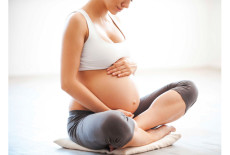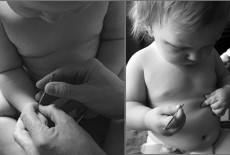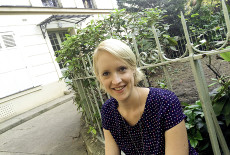Acupuncture and the Ancient Art of Improving Fertility
I see a lot of women and couples wanting to get pregnant. Acupuncture is becoming increasingly popular for it, because it’s a gentle, natural, and relaxing way to improve fertility.
I can’t help but reflect that acupuncture is a celebration of life. It gently encourages the body to be at its best, to perform at its highest potential. It does that by respecting the innate intelligence of the cells, tissues, and metabolic pathways at work. It’s a vastly different approach to medication which imposes a chemical reaction without trying to build on the strength the body already has.
There’s a long history of acupuncture assisting conception—Chinese medicine, which has been around for as long as 5000 years, talks a lot about having babies. There’s even an ancient literary reference to keeping the “fields” fertile.
Acupunture starts with looking at the menstrual cycle, because the monthly shedding of the uterine lining shows the flow of Qi and the movement of Blood, the moisture of Yin and the warmth of Yang that together paint a picture of the balance (or imbalance) of a woman’s hormonal portrait.
Yin and Yang and the Menstrual Cycle
Yin and Yang are two opposite forces that balance each other. Yin is cool, passive, retreating. Yang is hot, aggressive, expanding. Yin provides the moist material, the structure. Yang provides the capacity to do work on that structure. If life is a waterfall, Yin is the water, and Yang is the current that sweeps it through the riverbed so it can pour strongly over the edge. Yin can be compared to Blood. Yang can be compared to Qi, or metabolism.
The first half of the cycle is the time of Yin. In the West we call it the follicular phase, because one or more follicles with eggs inside grow. In the beginning estrogen and progesterone levels are low, which allows the uterine lining to break down. The quality of the blood that comes out is important for assessing Yin. Qi also plays a role here, in physical and psycho-emotional reactions to menses like cramps or mood changes.
Questions your acupuncturist might ask:
- Is the color a healthy red or is it brown, dark or purple?
- Is the texture a thin liquid or is it viscous or filled with clots?
- Is there spotting at the beginning or end?
- Is there pain such as cramps, back pain, breast tenderness, or a heavy feeling?
- Are your emotions volatile or are you irritable before or during menses?
By the end of the first half of the cycle, the Yin hormone FSH (follicle-stimulating hormone) has recruited one follicle to grow larger than the rest. This is the material structure developing so it can become available for Yang activity—the voyage from the fallopian tube to the endometrium. At this moment of maximum Yin, we see the cycle of nature at play: Yin gives birth to Yang, which grows until it reaches its zenith, and in turn gives birth to Yin. This mutual transformation is what sustains life.
The second half of the cycle is Yang, in the West called the luteal phase. It’s a time of movement and rising temperature thanks to Yang’s fire. The growth of the follicle initiates a flood of LH (luteinizing hormone), which causes the egg to travel to the uterus. The BBT (basal body temperature) heats up, which is important because an egg won’t find a home in a cold uterus. If there is a viable fertilized egg, the uterus itself becomes active, by pressing its front and back walls together to hold the implanting embryo in place while it makes a nest.
If pregnancy doesn’t occur, Yang transforms to Yin, the endometrium breaks down, and menstruation takes place.
How does acupuncture help the chances of becoming pregnant?
By naturally encouraging the body towards balance, acupuncture works on a number of levels. Chemically it optimizes hormone cascades so that Yin and Yang mature in the proper time. Physically it relaxes tissues and allows Qi and Blood to flow. Emotionally it removes stagnation that leads to stress and tension. Overall, it creates a sense of physical and emotional well-being.
Like any fertility assistance measure, it takes time—most acupuncturists advise trying it for 6-12 months to harmonize your cycle. One of the upsides to regular acupuncture, in addition to enjoying an hour every week to relax (so necessary in modern life, and crucial for fertility), is that secondary issues also improve along the way. Most patients report digestion, sleep, stress levels, immunity, and a host of other problems benefit. You can do acupuncture alone or in conjunction with IVF, where it can help balance the side effects of the drugs and prime the ovaries to release eggs.
Western tests generally don’t do a good job of quantifying acupuncture’s actions–they’re two different systems, and it’s a little like trying to explain sounds using only colors. But WebMD has a good article that cites a number of studies about acupuncture’s effects.
- It impacts areas of the brain that control the hormones affecting the ovaries.
- It has been shown to impact the number of eggs available during IVF, probably through increasing blood supply to the ovaries.
- It strengthens the lining of the uterus.
Acupuncture comes highly recommended by a number of doctors, and the American Pregnancy Association also points out it’s safe.
What about fertility assistance for men?
Men also have a cycle of fertility—it takes about 3 months to make sperm. It’s a cycle that’s constantly running, and it relies less on the kind of complicated hormonal interactions that characterize female fertility. For those reasons, it’s often easier to treat men if they have low sperm count, unusual sperm morphology, or motility issues.
Is acupuncture during pregnancy safe?
Millions of women worldwide have found it to be safe. When you can’t or don’t want to take medication to relieve some of the classic pregnancy buydiazepambest.com issues, it’s logical to turn to a modality that’s gently balancing.
The What to Expect Foundation (from the popular book series “What to Expect When You’re Expecting” that’s been educating moms and parents for over 30 years) endorses it for a number of issues:
- morning sickness
- back or pelvic pain
- turning a breach baby
- depression
- headaches
- sleep problems
Choosing a path in the journey to fertility
Everyone is different. Everyone is unique. Part of what I’ve learned as a practitioner is that a gift we can give ourselves, in fact we need to give ourselves, is permission to cherish our bodies. We’re walking around in a miraculous organism. It’s not perfect, but it doesn’t need to be in order to be incredible. When you seek out fertility assistance, find providers who respect your vision. This is a meaningful journey, and if you work with people who meet you on common ground, the quest becomes much more enjoyable.
Hayley Enright is a licensed acupuncturist and has performed over 9000 treatments. She is available for private and group sessions. You can contact her and learn more at www.acupuntureinparis.com.















Pingback: Manna Paris | Inspiring Source for Mothers Abroad MANNA Mamma: Zeva Bellel - Manna Paris
Pingback: Manna Paris | Inspiring Source for Mothers Abroad Saturday Morning Manna - Manna Paris